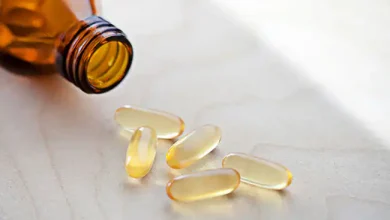The Top 5 Vitamins to Boost Your Immune System

Introduction to Vitamins and their Role in Boosting the Immune System
Vitamins are essential for a healthy body. They can be found in a variety of foods, such as fruits, vegetables, grains, and dairy products. The right combination of vitamins can help your body maintain a strong immune system. By consuming these essential vitamins on a regular basis, you can improve your overall health and immunity against disease and infection. Here are the top five vitamins that you should add to your diet to boost your immune system.
Vitamin A
Vitamin A is critical for proper functioning of the immune system. It helps protect against infections by stimulating the production of white blood cells, which are responsible for fighting off foreign invaders. Vitamin A can also be found in many foods such as carrots, sweet potatoes, spinach, kale and cantaloupe.
Vitamin B6
Vitamin B6 helps support the production of antibodies and regulates hormones levels. It is important in maintaining a healthy balance between the various parts of the immune system. Foods rich in vitamin B6 include legumes, nuts, seeds, potatoes and bananas.
Vitamin C
The most popular vitamin for boosting immunity is vitamin C. It helps increase the production of white blood cells which fight off bacteria and viruses. Vitamin C is found in many citrus fruits such as oranges and lemons as well as vegetables like broccoli and bell peppers.
Vitamin D
Vitamin D helps keep our bodies healthy by assisting with calcium absorption which then helps build strong bones and teeth. Additionally it aids in producing antibodies that protect us from harmful bacteria or viruses we may encounter throughout our day-to-day lives. You can find Vitamin D easily through exposing yourself to sunlight or consuming fortified foods like milk or cereal.
Vitamin E
This fat-soluble vitamin has been shown to help protect against free radical damage that may occur due to overactive immune systems or environmental toxins . Vitamin E can be found in vegetable oils (including soybean oil), nuts (especially almonds), green leafy vegetables (such as spinach) as well as fortified cereals.
Related Articles: The Top 6 Essential Vitamins and Supplements Every Men’s Health 2023
Vitamin C: Benefits, Sources, and Recommended Daily Intake
Vitamin C is a powerful nutrient that has a myriad of benefits to support your immune system. Vitamin C helps to protect your cells from damage caused by free radicals, which can weaken the immune system and make it more susceptible to disease. It also helps the body produce antibodies that fight off infection and illness. Additionally, Vitamin C supports the production of white blood cells, which are the first line of defense against harmful bacteria and viruses.
In terms of sources, Vitamin C can be found in many fruits and vegetables such as oranges, lemons, berries, kiwi fruit, mangoes, bell peppers, broccoli, spinach and cabbage. You can also find vitamin C in supplement form at most health food stores. The National Institutes of Health recommends a daily intake of 75–90 mg for adults.
Vitamin D is a key vitamin for boosting your immune system. This important fat-soluble vitamin works by increasing the production of antimicrobial peptides, which are the first line of defense against infection. Vitamin D also helps to activate and regulate the immune system, which helps the body fight against invading viruses and bacteria. Benefits: Vitamin D is responsible for calcium absorption, helping to build strong bones and teeth, as well as providing protection from certain autoimmune diseases like multiple sclerosis and diabetes. It also plays a role in cognitive function, helping improve mood by reducing depression and anxiety. Additionally, Vitamin D reduces inflammation in the body, which can help to keep infections at bay. Sources: The most natural source of Vitamin D is sunlight. Approximately 15 minutes per day of moderate sun exposure can provide you with enough Vitamin D on its own; however, if that’s not possible or feasible for you, there are several other sources available. Foods like eggs, fish (especially salmon and tuna), fortified milk products, mushrooms, and tofu all contain some amount of Vitamin D. Additionally, many cereals and yogurts are fortified with added Vitamin D as well as other vitamins and minerals for an extra boost to your daily intake. Recommended Daily Intake: Depending on age and lifestyle factors such as spending time outdoors or living in northern climates with limited sunlight exposure, the recommended daily intake can vary from 400 to 800 IU (International Units). It’s best to check with your doctor or healthcare provider about what is best for you specifically before increasing your daily consumption of Vitamin D.
Vitamin B6: Benefits, Sources, and Recommended Daily Intake
Vitamin B6 is essential for a healthy immune system. It helps produce hemoglobin which transports oxygen throughout the body and supports the cells that fight off infections. Vitamin B6 also plays an important role in making hormones and neurotransmitters that help regulate sleep, moods, and digestion. For optimal health benefits, adults should get 2 to 2.5 milligrams of vitamin B6 per day. Vitamin B6 can be found in a variety of foods including beef liver, potatoes, bananas, chickpeas, and fortified breakfast cereals. For vegans or vegetarians who do not get enough vitamin B6 from their diets, supplements can provide an additional boost.* To boost your immune system with vitamin B6, try adding some of these ingredients into your diet: potatoes (35% DV per one medium potato), banana (25% DV per one medium banana), beef liver (60% DV per 3 ounces), chickpeas (30% DV per one cup cooked), and fortified breakfast cereals (10-25% DV). Eating foods high in vitamin B6 can help keep your immune system strong so you can stay healthy all year round.
Zinc: Benefits, Sources, and Recommended Daily Intake
Zinc is an essential mineral that is vital for a strong immune system and overall health. Zinc plays an important role in a wide range of bodily processes such as cell growth, DNA synthesis, wound healing, and even the metabolism of carbohydrates. It also helps to increase the body’s response to infections by increasing the production of T cells and white blood cells responsible for fighting off infections. Studies show that zinc is one of the top vitamins for boosting your immune system. Taking zinc supplements or eating foods high in zinc can help increase your immunity to illnesses such as colds, flu, and even some types of cancer. The recommended daily intake for zinc is 8-11 mg per day for adults. Foods that are rich in zinc include oysters, beef, crab, lobster, fortified cereal grains, legumes, nuts and seeds. Zinc can also be found in dairy products and eggs but it is not as bioavailable as other sources. Additionally, zinc supplements are available over the counter at most pharmacies or grocery stores.
Probiotics: Benefits, Sources, and Recommended Daily Intake
Probiotics are beneficial bacteria that can be found in various foods and supplements. They help improve digestive health by increasing the number of good bacteria in the gut. Probiotics also have various other benefits, such as boosting immunity, reducing inflammation, and helping with weight loss. The best way to get probiotics is from food sources. Foods like yogurt, kefir, kimchi, miso soup, and tempeh are all rich in probiotics. You can also get them from fermented foods like sauerkraut and pickles. Additionally, there are many probiotic supplements available on the market. A general recommended daily intake of probiotics range from 5-10 billion colony forming units (CFUs). In addition to probiotics, vitamins are also important for a strong immune system. Here are some of the top 5 vitamins that can help boost your immune system:
- Vitamin C: Vitamin C is known for its antioxidant properties which helps protect against free radicals. It’s an essential nutrient that helps support a healthy immune system by stimulating white blood cells which fight infection.
- Vitamin E: This vitamin has strong anti-inflammatory properties and helps reduce oxidative stress in the body. It has been shown to increase antibody production in response to certain infections.
- Vitamin B6: This vitamin plays an important role in strengthening the immune system by aiding in red blood cell production and regulating hormones related to immunity.
- Vitamin A: Vitamin A is essential for proper functioning of the immune system as it helps activate T cells which fight off pathogens.
- Zinc: Zinc has been linked to better immunity as it is necessary for white blood cell activation and antibody production.
It’s important to note that vitamins should not be taken as substitutes for medical treatments or advice from healthcare professionals. Talk to your doctor about what vitamins may work best for you based on your individual needs.
Conclusion
The vitamins and minerals essential for immune system health are innumerable, but five of the most important are Vitamin C, Vitamin D, Zinc, Beta-Carotene and Folate. Supplementing with these nutrients can increase your body’s natural defenses against viruses and bacteria. When topping off your vitamin supply, remember that a balanced diet filled with whole foods is still the best way to ensure optimal health. Eating a variety of fruits, vegetables, nuts and healthy proteins can provide the vitamins you need in their most natural forms.




